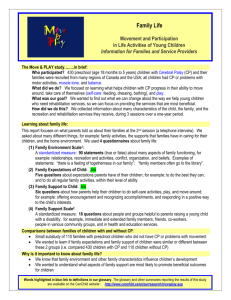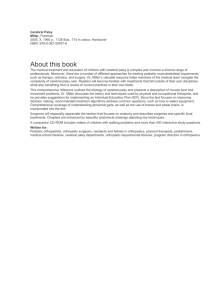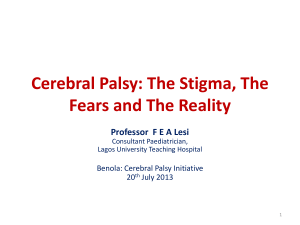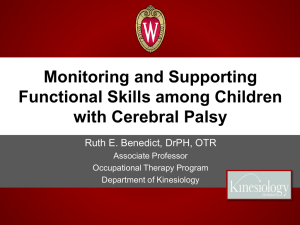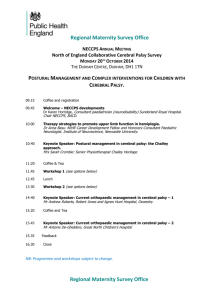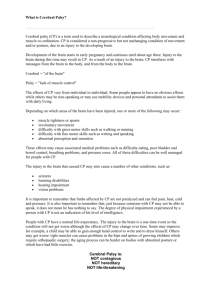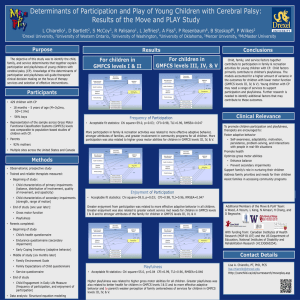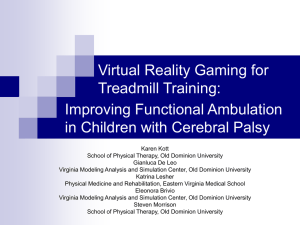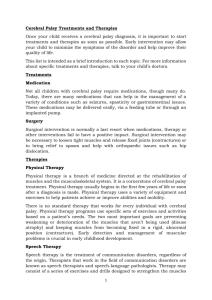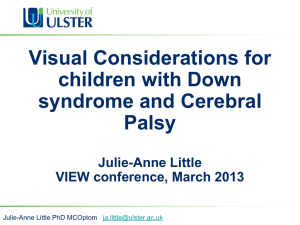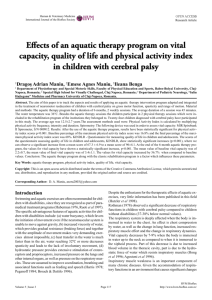Knowledge Translation Survey Welcome! The purpose of this study
advertisement
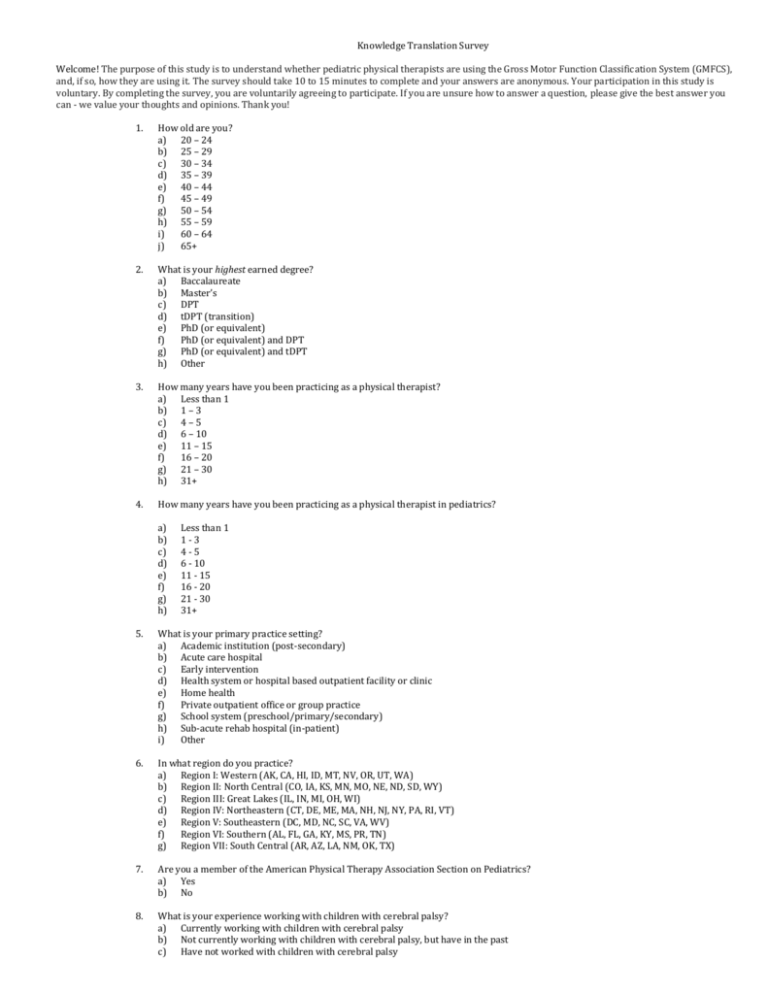
Knowledge Translation Survey Welcome! The purpose of this study is to understand whether pediatric physical therapists are using the Gross Motor Function Classification System (GMFCS), and, if so, how they are using it. The survey should take 10 to 15 minutes to complete and your answers are anonymous. Your participation in this study is voluntary. By completing the survey, you are voluntarily agreeing to participate. If you are unsure how to answer a question, please give the best answer you can - we value your thoughts and opinions. Thank you! 1. How old are you? a) 20 – 24 b) 25 – 29 c) 30 – 34 d) 35 – 39 e) 40 – 44 f) 45 – 49 g) 50 – 54 h) 55 – 59 i) 60 – 64 j) 65+ 2. What is your highest earned degree? a) Baccalaureate b) Master’s c) DPT d) tDPT (transition) e) PhD (or equivalent) f) PhD (or equivalent) and DPT g) PhD (or equivalent) and tDPT h) Other 3. How many years have you been practicing as a physical therapist? a) Less than 1 b) 1 – 3 c) 4 – 5 d) 6 – 10 e) 11 – 15 f) 16 – 20 g) 21 – 30 h) 31+ 4. How many years have you been practicing as a physical therapist in pediatrics? a) b) c) d) e) f) g) h) Less than 1 1-3 4-5 6 - 10 11 - 15 16 - 20 21 - 30 31+ 5. What is your primary practice setting? a) Academic institution (post-secondary) b) Acute care hospital c) Early intervention d) Health system or hospital based outpatient facility or clinic e) Home health f) Private outpatient office or group practice g) School system (preschool/primary/secondary) h) Sub-acute rehab hospital (in-patient) i) Other 6. In what region do you practice? a) Region I: Western (AK, CA, HI, ID, MT, NV, OR, UT, WA) b) Region II: North Central (CO, IA, KS, MN, MO, NE, ND, SD, WY) c) Region III: Great Lakes (IL, IN, MI, OH, WI) d) Region IV: Northeastern (CT, DE, ME, MA, NH, NJ, NY, PA, RI, VT) e) Region V: Southeastern (DC, MD, NC, SC, VA, WV) f) Region VI: Southern (AL, FL, GA, KY, MS, PR, TN) g) Region VII: South Central (AR, AZ, LA, NM, OK, TX) 7. Are you a member of the American Physical Therapy Association Section on Pediatrics? a) Yes b) No 8. What is your experience working with children with cerebral palsy? a) Currently working with children with cerebral palsy b) Not currently working with children with cerebral palsy, but have in the past c) Have not worked with children with cerebral palsy 9. Have you heard of the Gross Motor Function Classification System? a) Yes, I have heard of it b) No, I have not heard of it Comments: 10. Where did you first hear about the GMFCS? (Please select one option) a) Colleague or mentor b) Conference/in-service/workshop c) Professional academic program (eg, BS, MPT, DPT) d) Postprofessional academic program (eg, MS, DSc, PhD, transition DPT) e) Research article f) Do not remember g) Other (please list)_____________________ 11. In your opinion, is the GMFCS useful for classifying children with cerebral palsy? a) Yes, I think it is useful b) No, I do not think it is useful Comments: 12. Are you confident in your ability to use the GMFCS for children with cerebral palsy as part of your clinical decision-making (eg, to assist with goal setting, to discuss potential outcomes of interventions with families, to interpret Gross Motor Function Measure (GMFM) scores, etc.)? a) Yes, I am confident in my ability to use the GMFCS b) No, I am not confident in my ability to use the GMFCS Comments: 13. Do you use the GMFCS for children with cerebral palsy as part of your clinical decision-making (eg, to assist with goal setting, to discuss potential outcomes of interventions with families, to interpret GMFM scores, etc.)? a) Yes, I use it as part of my clinical-decision making b) No, I do not use it as part of my clinical-decision making Comments: 14. Do you consistently use the GMFCS for children with cerebral palsy as part of your clinical decision-making (eg, to assist with goal setting, to discuss potential outcomes of interventions with families, to interpret GMFM scores, etc.?) a) Yes, I use it consistently (90% or more of the time) b) No, I do not use it consistently (less than 90% of the time) Comments: 15. Which of the following sources contributed most… Colleague or Mentor To your opinion that the GMFCS is a useful classification system for children with cerebral palsy? To your confidence in using the GMFCS for children with cerebral palsy? To your decision to use the GMFCS for children with cerebral palsy? To your decision to consistently use the GMVCS for children with cerebral palsy? Conference /in-service /workshop Professional Academic Program (BS, MPT, DPT) Post-professional academic program (eg. MS, DSc, PhD, transition DPT) Research Article Not Applicable Other (please list) 16. For children with cerebral palsy, to what extent do you use the GMFCS to… 1 (not at all) 2 3 4 5 (a great extent) 4 5 (a great extent) Predict future gross motor function Decide frequency and duration of services? Set realistic goals? Anticipate need for assistive technology? Anticipate outcomes of intervention based on research results stratified by GMFCS level? Interpret a child’s Gross Motor Function Measure (GMFM) scores by comparing with scores of children of similar age and GMFCS level? 17. For children with cerebral palsy, to what extent do you use the GMFCS with their families to… 1 (not at all) Help them understand their child’s predicted future gross motor function Discuss frequency and duration of services? Set realistic goals together? Discuss anticipated needs for assistive technology? Help them understand anticipated outcomes of intervention based on research results stratified by GMFCS level? Share interpretations of their child’s scores on the GMFM? 2 3 Page Six Thank you for your participation! Your participation in this survey will contribute to our knowledge about current physical therapy practice for children with cerebral palsy. If you'd like, you may enter your e-mail address below and we will update you on the results of this study. Email address: Additional comments:
